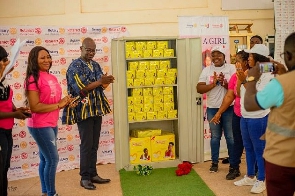Various studies have revealed that teen girls in low socio-economic communities cannot afford sanitary products and turn to using unhygienic materials and products.
The lack of access to sanitary pads during menstruation can have significant negative effects on young girls. About 66% of girls do not want to be at school when they are on their period due to negative associations, shame, depression, and embarrassment from staining themselves in school. This also reduced participation in daily activities and potential health problems.
It is for this reason that the Rotary Club of Obuasi has collaborated with three other non-governmental Organisations in Obuasi, namely the Self-Love Foundation, Girls Shall Grow and Gold City Mummies to establish a pad bank in Obuasi. This was launched on the May 26 at Obuasi Secondary-Technical School.
The launch of the pad bank forms part of activities to mark World Menstrual Hygiene Day. The purpose of establishing the sanitary pad bank, according to Rtn. Delphine Gborgblorvor, a member of the Rotary Club, was to make sanitary pads accessible to girls from deprived homes who could not afford them when they are about to menstruate.
In Ghana, sanitary pads are subject to a 20% import tax and a 12.5% value-added tax. This makes it expensive for girls from an average Ghanaian home to access it and it can have negative impacts on their health, education, and well-being.
Rotarian Delphine said the Rotary Club realising the difficulties girls go through during their menstruation period and efforts by local NGOs to supply sanitary pads, decided to bring all of them together under one umbrella to establish the pad bank where individuals, groups, and organisations can donate sanitary pads which will be distributed to vulnerable girls.
She said: "The pad bank initiative is targeted at girls from poor homes who ordinarily can't afford these pads. The Girl Child Coordinators in GES will identify these needy girls and withdraw pads from the banks when needed".
She made an appeal to other NGOs, individuals, and organizations to deposit sanitary pads to the bank at any point in time to sustain the program.
Government must supply free sanitary pads
The Executive Director of Girls Shall Grow, Louisa Amoah, called on the government to intervene in making sanitary pads accessible to girls, especially those from deprived communities. She said it was unacceptable to have girls skip school during menstruation.
"Government has a role to play in ensuring sanitary pads are accessible to girls. The prices however around Gh20 to Gh25 per pack making it difficult for some girls to afford. Government should reduce the various taxes of sanitary materials to make it cheaper on the market", she stated.
She also advised that, as government is doing its best to make education accessible and less expensive through the supply of free text books and other learning materials, it should also consider introducing free sanitary pads.
The Obuasi Municipal Director of Education, George Alfred Koomson, lauded the four (4) groups for teaming up to introduce the sanitary pad bank.
He was of the view that the initiative will help keep girls in school during the period of menstruation. He intimated that seeing young girls improvising with all kinds of unsafe materials during menstruation was worrying.
Rotary Club and the other NGOs supplied free sanitary pads to over 500 students who thronged the Obuasi Sec tech Senior high school auditorium during the launch. The group seized the opportunity to educate the girls on safe and hygienic menstruation.
Speaking with the media, the participants commended the groups for the gesture and said the sanitary pad bank will provide the relief they needed during menstruation.
They called on the government to support them with free sanitary materials.
Regional News of Tuesday, 30 May 2023
Source: Sampson Manu

















